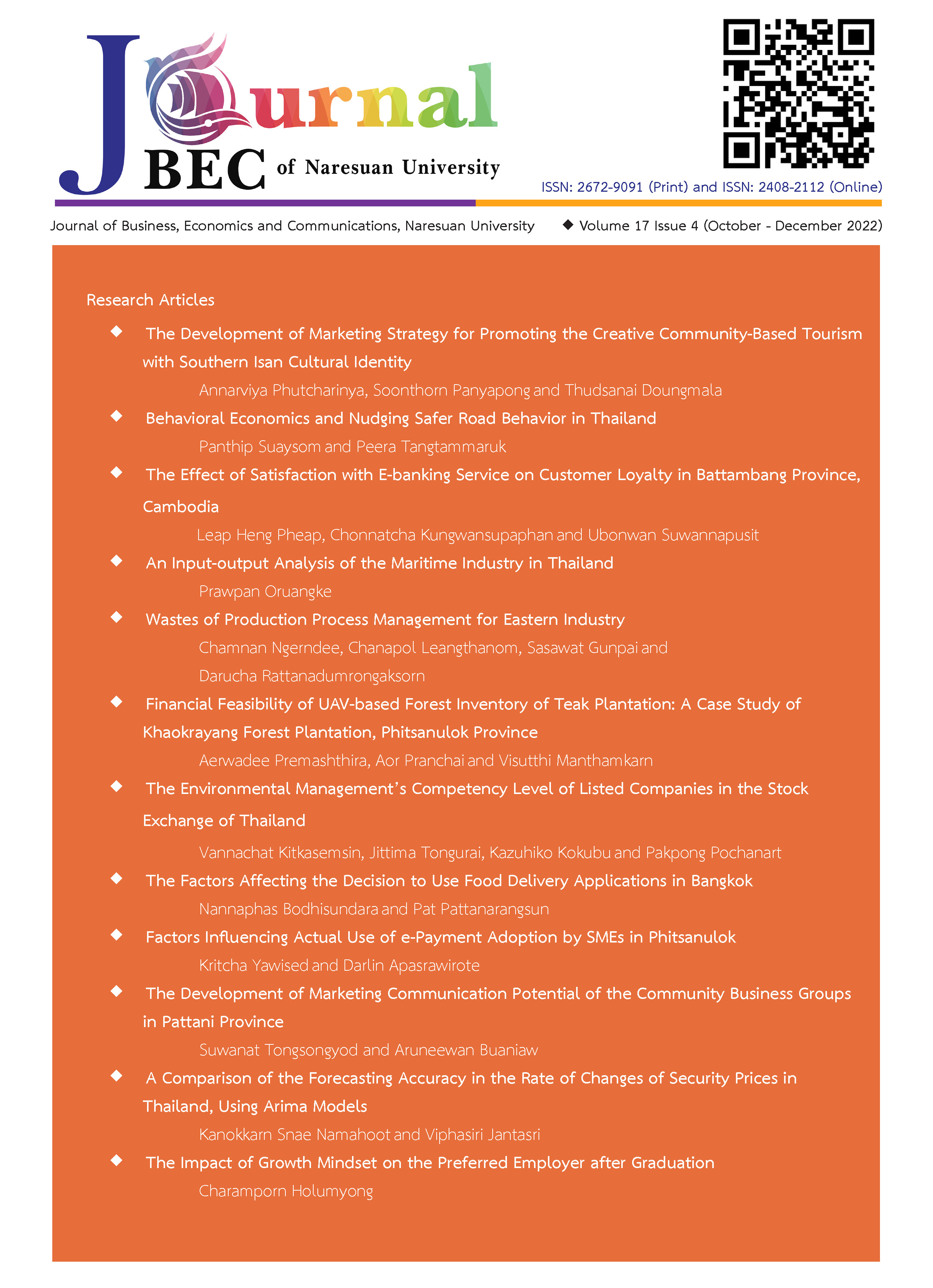The Factors Affecting the Decision to Use Food Delivery Applications in Bangkok
Main Article Content
บทคัดย่อ
This study combines exploratory research and quantitative research which aimed to determine the factors affecting the decision to use food delivery applications in Bangkok, consisting of personal factors, customer behavior regarding the use of food delivery applications, marketing mix factors, food delivery application service perceptions and acceptance. The researcher collected data using online questionnaires from 400 samples that have used food delivery applications in Bangkok, which were obtained by accidental sampling and analyzed by the multinomial logit model with four dependent variables: GrabFood (Reference Application), LINE MAN, foodpanda, and Gojek. The results, which were divided into three cases (LINE MAN, foodpanda, and Gojek), revealed that the factors affecting the decision to use food delivery applications in Bangkok at the statistical significance level of 0.10 were: 1) generation, status, income, discounts in the application, type of restaurant, and marketing mix in terms of the process for LINE MAN; 2) gender, status, income, frequency of using service, saving time in traveling, type of food, type of restaurant, and marketing mix in terms of physical evidence for foodpanda; and 3) status, payment method, time running the application, and marketing mix in terms of price for Gojek. According to this research, the entrepreneurs were able to apply the research findings to develop the applications and formulate strategies for consumer satisfaction.
Article Details

อนุญาตภายใต้เงื่อนไข Creative Commons Attribution-NonCommercial-NoDerivatives 4.0 International License.
เอกสารอ้างอิง
Bangkok Bank. (2020). Insights into competitive strategies to become the food delivery market leader. Retrieved September 15, 2020, from https://www.bangkokbanksme.com/en/food-delivery-marketing-strategy
Bodhisundara, C. (2018). Factors affecting the frequency of promptpay service usage of Bangkok bank public company limited customers in Amphoe Mueang Changwat Chon Buri. Independent Study, M.Econ., Kasetsart University, Chonburi.
Buntanapeerat, P. (2017). Factors affecting consumer choice of food delivery services in the Bangkok metropolitan area, Thailand. Independent Study M.B.A., Thammasat University, Bangkok.
Chatrawanitch, J. and Pasunon, P. (2020). Factor analysis of customer decisions regarding the purchase of street food in Bangkok. Journal of Economics and Management Strategy, 7(2), 93-108.
Chaveesuk, S. and Vongjaturapat, S. (2013). Unified theory of acceptance and use of technology: UTAUT2. Retrieved March 30, 2021, from http://www.it.kmitl.ac.th/~journal/index.php/main_journal/article/view/2
Cochran, W. G. (1997). Sampling techiques (3rd ed.). New York: John Wiley & Sons. Electronic Transaction Development Agency. (2020). Thailand internet user behavior 2019. Bangkok: Electronic Transaction Development Agency.
Gray, R. (2019). Consumer behaviour theory: How has it changed. Retrieved March 30, 2021, from https://fastpayltd.co.uk/blog/consumer-behaviour-theory-how-has-it-changed/#:~:text=Consumer%20behaviour%20theory%20is%20the,consumer%20will%20make%20a%20purchase
Intranon, N. (2017). A study of different generations in the need for flexible benefits: A case study of office of the national broadcasting and telecommunications commissions of Thailand (ONBTC). Master thesis, M.B.A., Thammasat University, Bangkok.
Javatpoint. (n.d.). Linear regression vs logistic regression. Retrieved March 27, 2021, from https://www.javatpoint.com/linear-regression-vs-logistic-regression-in-machine-learning
Kaiyawan, Y. (2012). Principle and using logistic regression analysis for research. Rajamangala University of Technology Srivijaya Research Journal, 4(1), 1-12.
Kasikorn Research Center. (2019). Competition among food delivery apps continues to push food delivery business to THB 33-35 billion in 2019. Retrieved September 18, 2020, from https://www.kasikornresearch.com/th/analysis/k-econ/business/Pages/z2995.aspx
Kieniam, W. and Rajkulchai, S. (2019). Marketing innovations affecting to service satisfaction in seacon Bangkhae department store. In The eleventh national academic conference of 2019 (p. 1409). Bangkok: Siam University.
Musikacharoen, C. (2020). Kasikorn research center reveals the food delivery business has grown by 78-84% in 2020. Retrieved September 18, 2020, from https://www.efinancethai.com/LastestNews/LatestNewsMain.aspx?ref=A&id=aUNZQVJBMnNLMVU9
Office of Trade Competition Commission. (2020). In A. Kutranon (Eds.), Competitive behavior in food delivery businesses that may be illegal (p. 2). Bangkok: Office of Trade Competition Commission.
Oxford College of Marketing. (2020). Understanding the 7Ps of the marketing mix. Retrieved June 8, 2021, from https://blog.oxfordcollegeofmarketing.com/2020/10/08/understanding-the-7ps-of-the-marketing-mix
Panwarasin, L. (2010). A comparison of consumer’s attitude and behavior on ice cream Walls and Nestle in Bangkok metropolitan area. Master thesis, M.B.A., Srinakharinwirot University, Bangkok.
Phongsupat, N. (2018). A study on food application market and consumer behavior regarding food application choice. Master thesis, M.B.A., Thammasat University, Bangkok.
Sedtheetorn, S. (2019). Food delivery business in Thailand. In S. Sedtheetorn (Eds.), Thailand food market report (pp. 1-8). Bangkok: Food Intelligence Center.
Suthanathan, P. (2014). Factors affecting consumers’ behavior and marketing mix factors on 3G mobile networking providers in Bangkok metropolitan area. Master thesis, M.B.A., Nation University, Bangkok.
Wongnai. (2019). Summary of information and trends in the restaurant business in Thailand for the year 2019. Retrieved October 2, 2020, from https://www.wongnai.com/business-owners/thailand-restaurant-trend-2019


